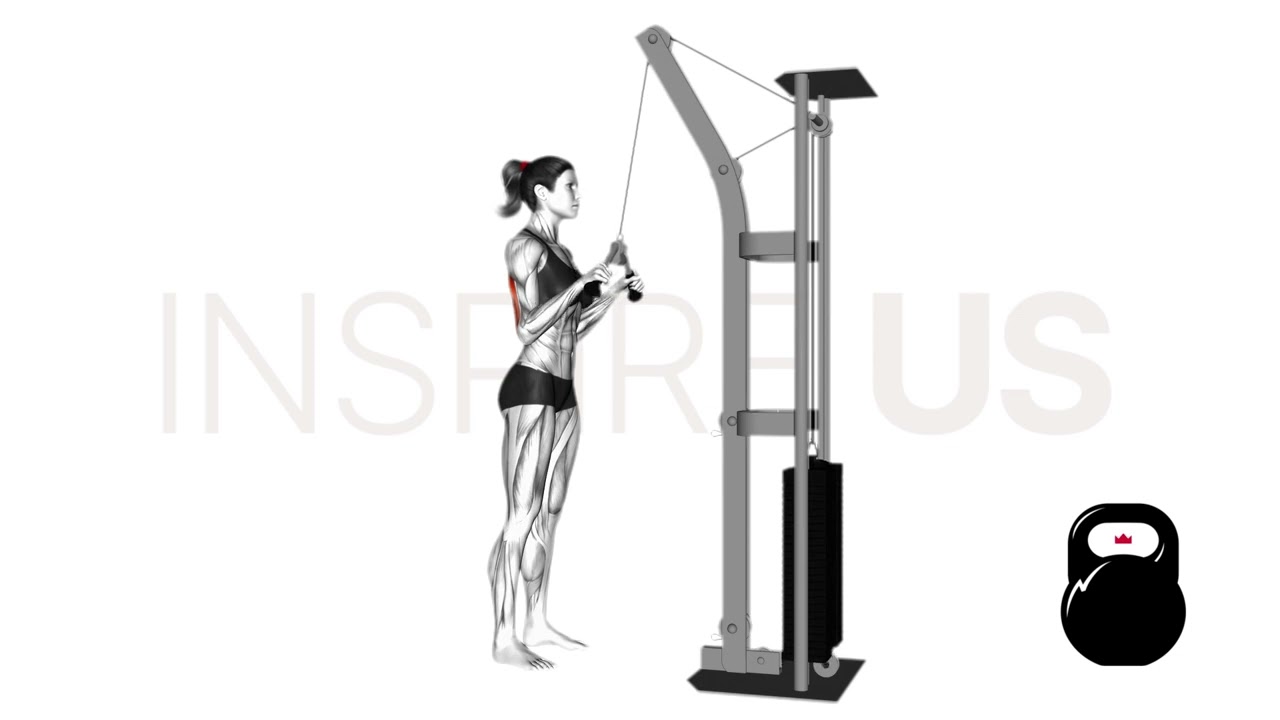Triceps Pushdown: Benefits, Muscles Worked, and Variations
Out of all the triceps-focused exercises, there are few as simple yet effective as the triceps pushdown - a machine-based exercise that works the entire triceps muscle to an excellent degree.
Due to the similarity in appearance of the triceps pushdown and several other exercises, it is important to understand what makes the former movement unique, and how best to maximize the many benefits that it offers.
To put it in a nutshell, the triceps pushdown is a cable machine exercise performed with both hands in a pronated form, wherein the lifter will push the machine’s handle from chest-height down to their legs in a single elbow-driven movement.
What is the Triceps Pushdown?
In more technical terms, the triceps pushdown is a single-joint isolation exercise that makes use of elbow extension to work the triceps brachii for high volume sets.
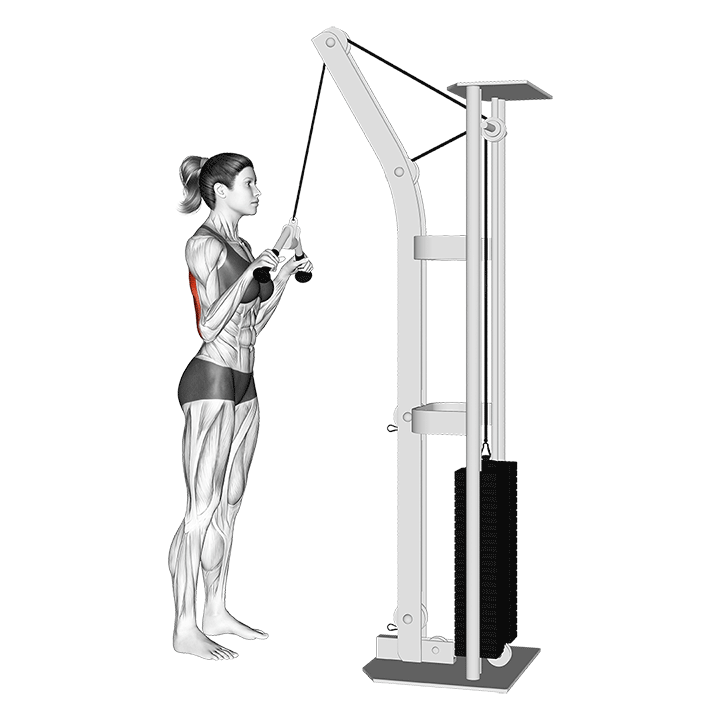
It is often used in training programs as an accessory exercise to heavier compound movements that also involve the triceps, such as the barbell bench press or dips.
Who Should do Tricep Pushdowns?
Tricep pushdowns are appropriate for lifters of all types, as they are quite simple and considerably low impact.
Bodybuilders in particular favor the tricep pushdown due to its capacity to isolate the triceps for a significant amount of repetitions per set, greatly contributing to upper arm hypertrophy as a result.
Equipment Needed to Tricep Pushdown
The triceps pushdown will require a cable machine, as well as any number of different handles; like ropes, straight bars, a EZ-curl bar handle or even a pair of single-hand cable attachments.
How-to Tricep Pushdown
To perform a repetition of the triceps pushdown, the lifter will stand facing the cable machine housing, handles held at approximately chest height with both hands in an overhand grip.
Ensuring that the torso and upper arms remain as stationary as possible, the lifter will then push through their hands, moving the handle lower until they have reached the full range of motion of their arms.
From this point, they will slowly return the handle to its original elevation around their chest, thereby completing the repetition.
What Muscles are Worked by the Triceps Pushdown?
The triceps pushdown is an isolation exercise, and as such will only recruit a single muscle group in a dynamic fashion - that being the triceps brachii of the upper arms.
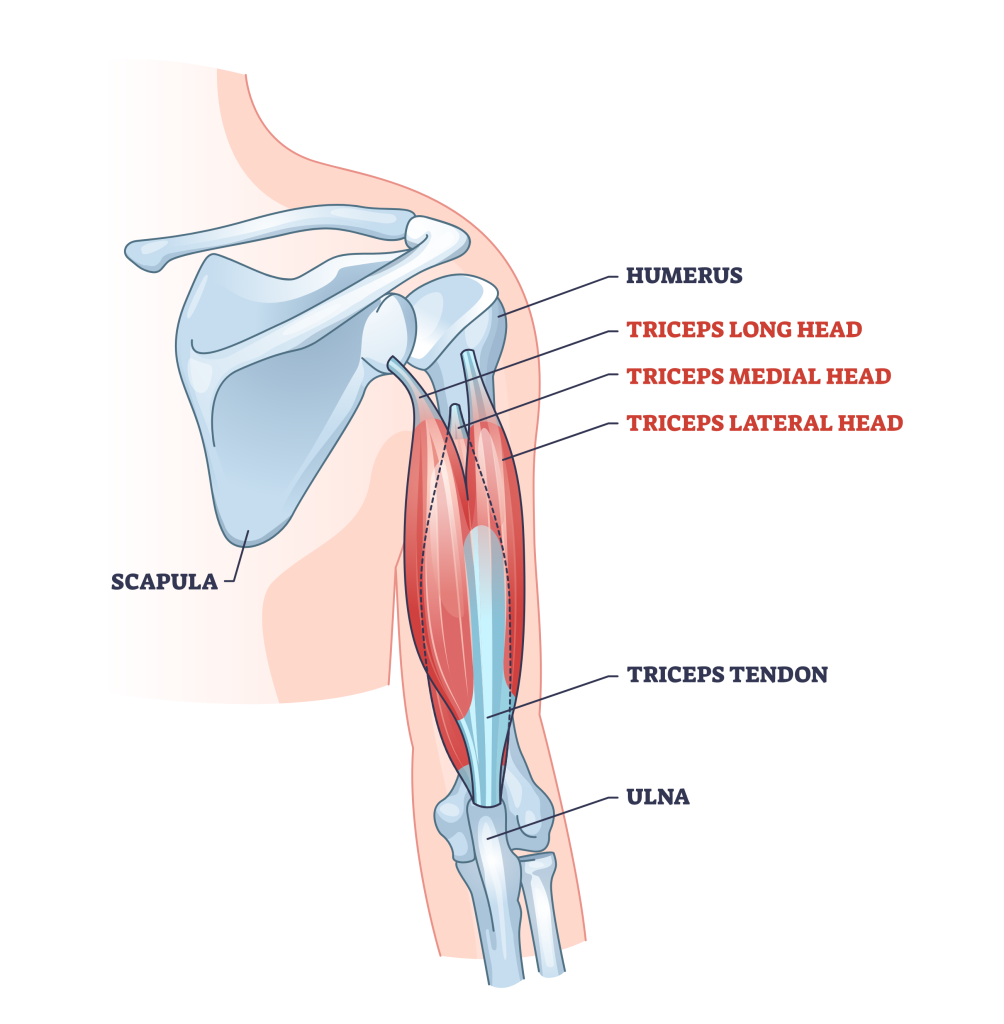
While other muscle groups like the forearms may be used as stabilizers, they are not recruited by the exercise to a significant enough degree to result in any sort of development.
What Part of the Triceps is worked by Triceps Pushdowns?
In particular, the triceps pushdown will place the most focus on the long or outer head of the triceps, greatly contributing to the appearance of width and thickness of the upper arm from both a lateral and anterior view.
What are the Benefits of Doing Tricep Pushdowns?
Apart from the usual benefits of performing resistance exercise (like caloric expenditure and better endocrinological health), the tricep pushdown is also excellent for achieving certain effects that are not as easily replicated with different exercises - many of which have to do with programming and development of the triceps muscles.
Excellent Triceps Builder
Even among other triceps isolation exercises, the tricep pushdown is particularly effective due to its time under tension and high capacity for volume per set.
It is this particular benefit that has made the tricep pushdown a staple in many bodybuilding training programs, rivaling movements like the skullcrusher and overhead triceps extension.
Reinforcement of Elbow Extension
As the main function of the triceps brachii is to contribute to the biomechanic of elbow extension, it should be no surprise that any exercise training the triceps will also reinforce elbow extension (pictured below) in the lifter.
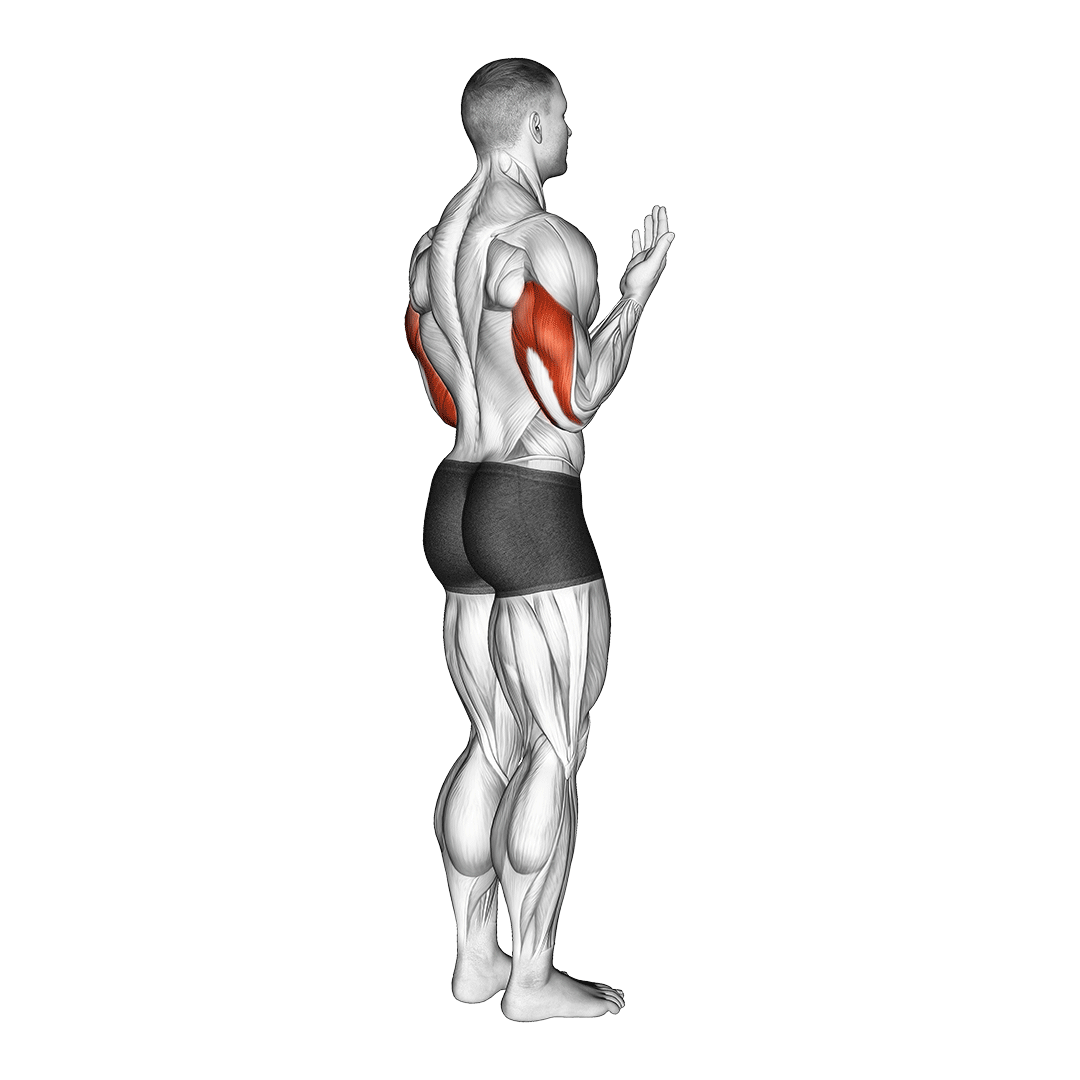
This, in turn, will lead to a more stable elbow while it is in a state of extension, as well as reduce any risk of future injury during exercises that also utilize the elbow extension biomechanic.
Low Impact, Low Complexity, and Easy to Program
The main benefit to the triceps pushdown (apart from the muscular growth) lies in its simplicity and ease of execution, where even a total novice with little to no experience in resistance training can learn to perform the exercise.
Furthermore, due to its low impact and nature as an isolation exercise, the triceps pushdown is also quite easy to program - be it high resistance and low volume or as a high-volume accessory.
Constant Time Under Tension for the Triceps
More of a benefit of nearly all machine based exercises, the triceps pushdown will place a near-constant time under tension on the muscles of the triceps, making it excellent for inducing muscular hypertrophy or otherwise improving the endurance of the arms.
This particular type of training stimulus is especially useful for reinforcing mind-muscle connection, as it will take significant focus to push through high-volume endurance sets of the triceps pushdown.
Common Mistakes of the Triceps Pushdown
While the triceps pushdown is indeed quite a simple exercise, there are nonetheless several mistakes that lifters of all levels frequently make when performing it - all of which will take away from the effectiveness of the exercise itself, if not put the lifter at risk of injury.
Bending Forward at the Waist or Legs
The triceps pushdown is meant to solely target the triceps brachii, and any sort of reduction in the total range of motion would be counterintuitive to the development of said triceps.
This primarily happens when the lifter subconsciously bends forward at the waist or knees, shifting the stress to other muscles in the upper body and reducing the range of motion.
Swinging the Upper Arms or Elbows
Just as is the case in many other arm muscle isolation exercises, swinging the upper arms or elbows can produce momentum that negates much of the benefit of the exercise itself.
For the triceps pushdown, this will not only reduce the recruitment of the triceps themselves, but also potentially place it on other nearby muscles like the deltoids or lats.
Standing too Far From the Cable Machine
An often overlooked mistake of the triceps pushdown is the actual position of the lifter in relation to the cable machine. If they stand too far, it is likely that the cable is being pulled at an angle, forcing the lifter to move their elbows behind them just to complete the range of motion.
Not only is this a mistake, but it can also reduce the effectiveness of the exercise. Ideally, the lifter should stand only one to two steps away from the machine, with the cable housing almost directly overhead for the ideal angle of resistance.
Variations of the Triceps Pushdown
The majority of triceps pushdown variations are differentiated by what sort of handle is used, as performing the exercise with a neutral grip or pronated grip can affect what part of the triceps muscle group is emphasized the most.
1. Rope Triceps Pushdown
The rope triceps pushdown features a neutral grip and more forgiving hand positioning due to the nature of using ropes as a handle - but will also reduce the maximum amount of weight that the lifter can use, as greater stabilization will be needed.
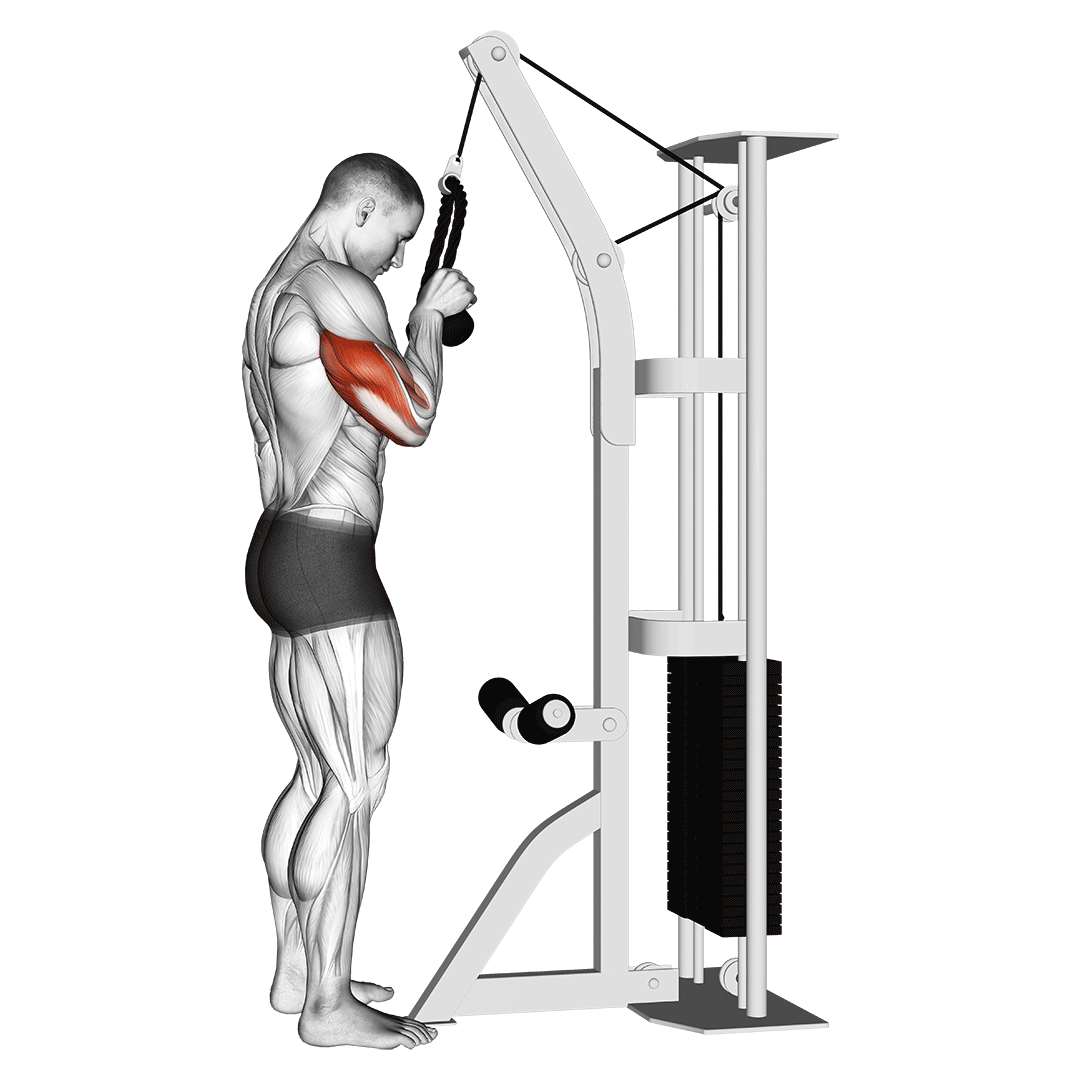
2. V-Bar Triceps Pushdown
The V-bar triceps pushdown is a triceps pushdown variation that makes use of an angled bar so as to reduce the stress placed on the wrists during the exercise.
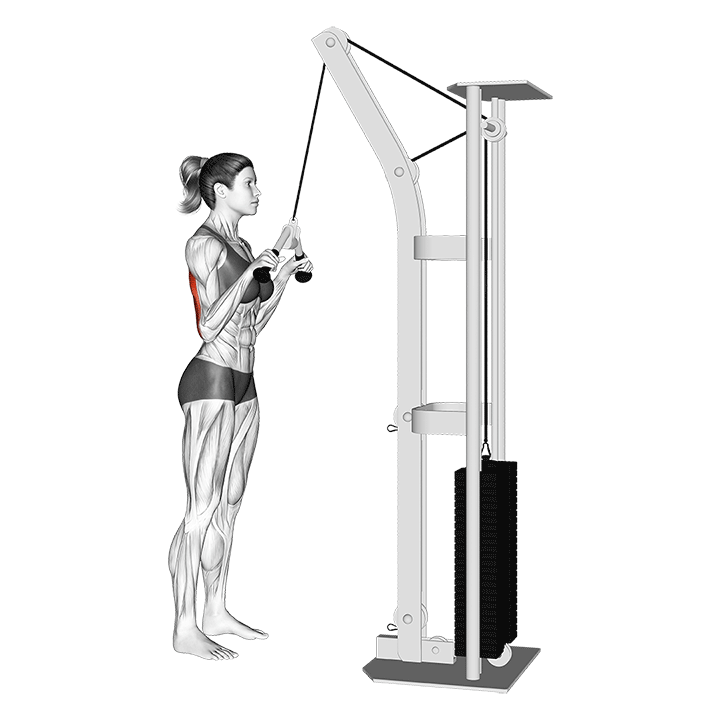
In comparison to other triceps pushdown variations, it retains much of the benefits of performing the exercise with a straight bar, only without the discomfort and wrist strain that may come with it.
3. Straight Bar Triceps Pushdown
The straight bar triceps pushdown is the ideal variation for maximizing how much weight is moved, as its rigid handle and highly pronated grip allow for a more advantageous position and better leverage against the resistance of the cable machine.
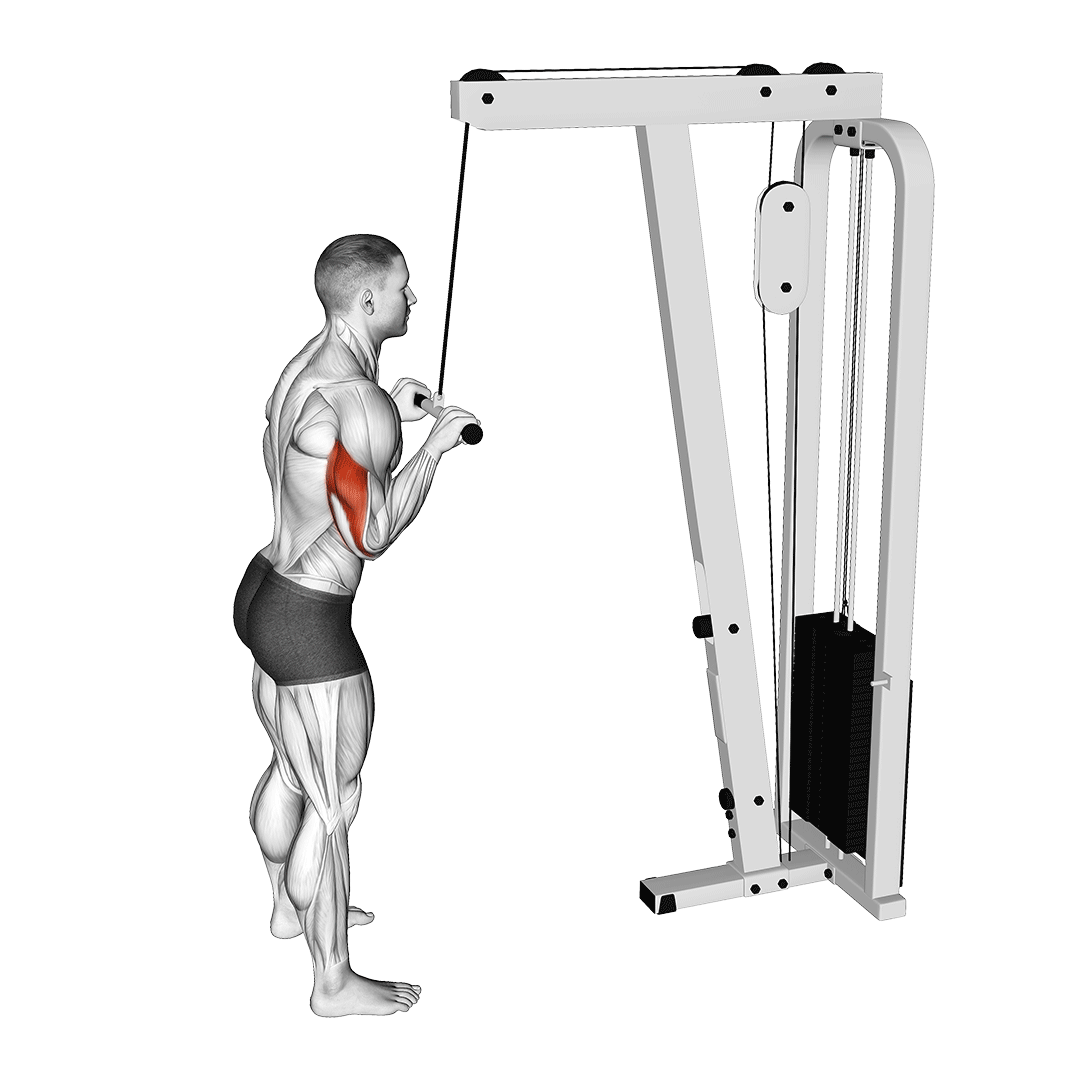
4. EZ-Curl Bar Cable Machine Triceps Pushdown
For all the benefits of a straight bar tricep pushdown without the discomfort, the EZ-bar attachment variation may be used - allowing for significant weight to be moved without placing the forearms and wrists in a potentially uncomfortable position.
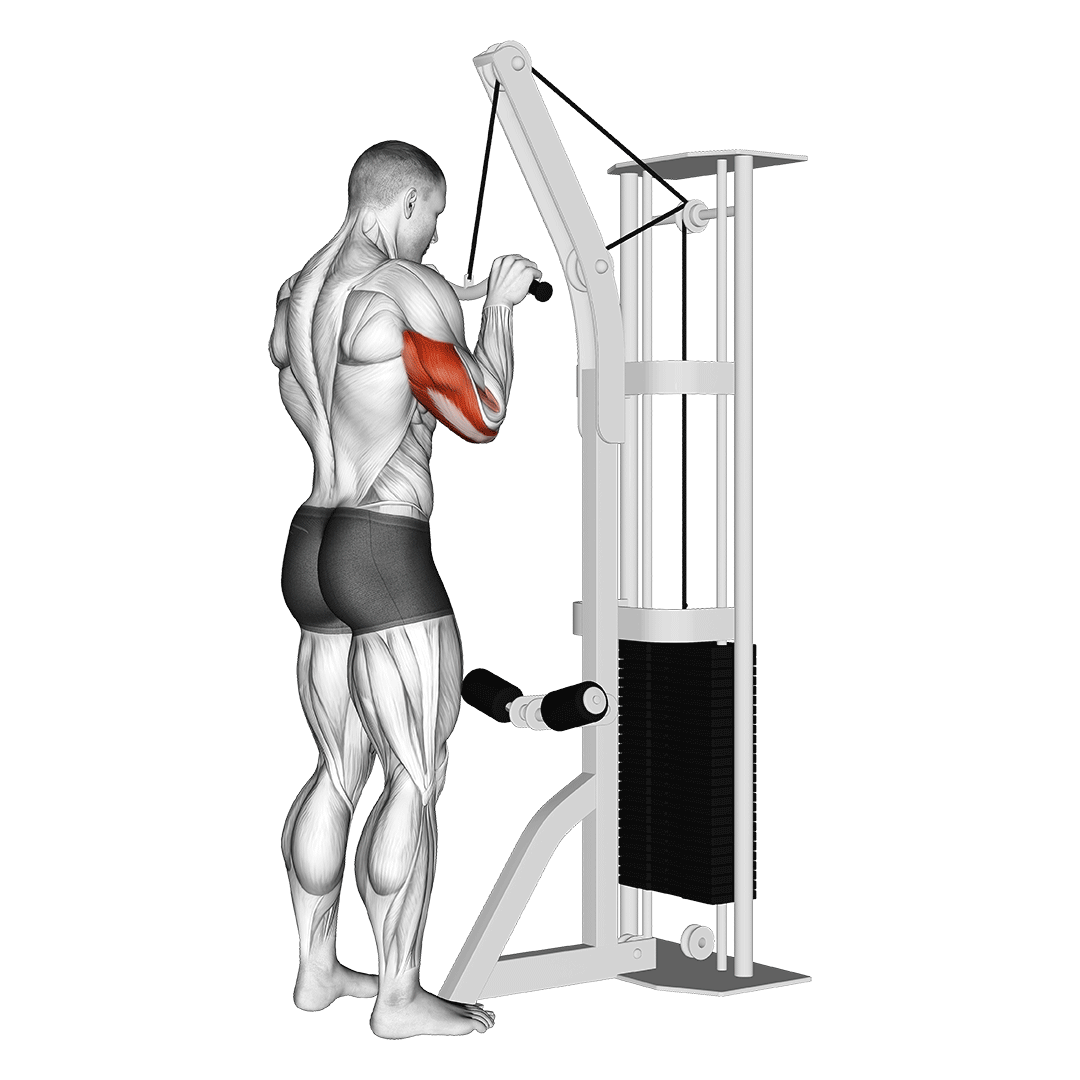
5. Resistance Band Triceps Pushdown
In the event that the lifter has no access to a cable machine, it is entirely possible to replicate the exercise with the use of a resistance band.
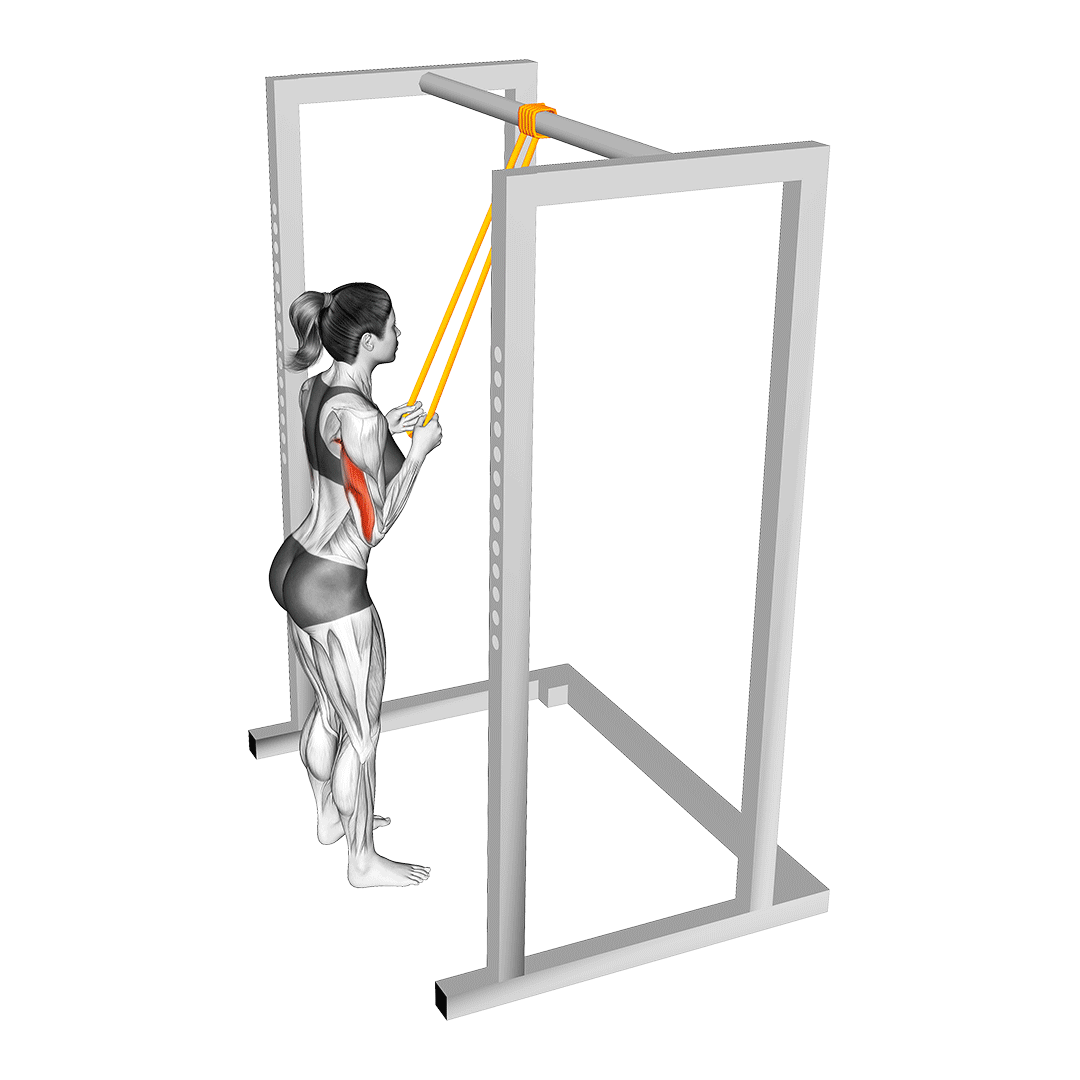
Simply attaching it to an object overhead and placing both hands at the opposite end of the band can create an exercise mechanically identical to the triceps pushdown in a pinch.
Frequently Asked Questions (FAQ)
What is the Triceps Pushdown Good for?
Triceps pushdowns are excellent for isolating the triceps brachii in a manner that builds significant mass and strength.
It is a particular favorite among bodybuilders due to its low impact and ease of performance, though lifters of all types use it as a way to tone the upper arms.
Which Tricep Pushdown is Best?
Which triceps pushdown variation is the best will depend on what sort of goals and needs you have.
For lifters wishing to avoid wrist pain, reverse grip or rope tricep pushdowns may be the best choice, whereas lifters wishing to maximize weight loading can use a straight bar or V-bar tricep pushdown.
What is the Difference Between Tricep Pushdowns and Extensions?
The main distinction between tricep pushdowns and tricep extensions lie in the focus of the exercise.
Tricep pushdowns are performed with the triceps working counter to an upward resistance, and as such will better target the long or outer head of the triceps, whereas extensions will target the inner and medial head to a greater degree.
Final Thoughts
For the best results, perform the triceps pushdown as an accessory exercise near the end of your workout - with 2-3 sets of 8-12 repetitions each, your triceps will be growing in no time.
And as always, ensure that the exercise is performed with as perfect form as is manageable. It will not only ensure that no injuries occur, but that the triceps are also worked to their fullest extent as well.
References
1. Kholinne E, Zulkarnain RF, Sun YC, Lim S, Chun JM, Jeon IH. The different role of each head of the triceps brachii muscle in elbow extension. Acta Orthop Traumatol Turc. 2018;52(3):201-205. doi:10.1016/j.aott.2018.02.005
2. Hussain J, Sundaraj K, Subramaniam ID, Lam CK. Muscle Fatigue in the Three Heads of Triceps Brachii During Intensity and Speed Variations of Triceps Push-Down Exercise. Front Physiol. 2020 Feb 21;11:112. doi: 10.3389/fphys.2020.00112. PMID: 32153422; PMCID: PMC7047337.

